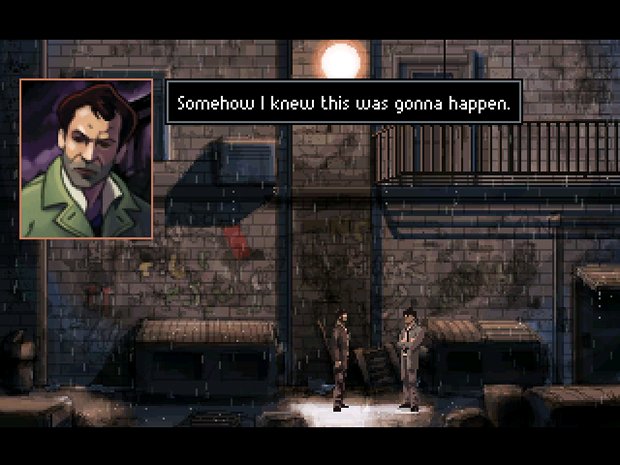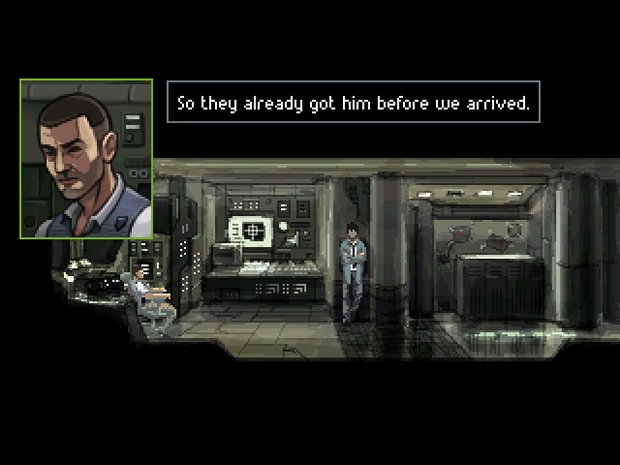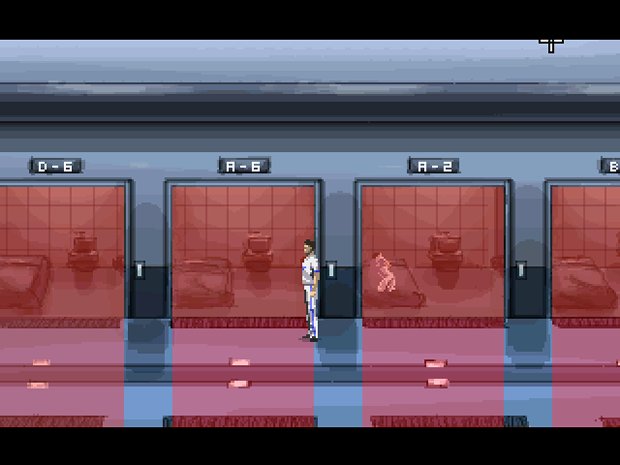GamesRadar+ Verdict
Pros
- +
Gritty world and interesting characters
- +
Feeling like a crime investigator
- +
Unpredictable plot twists
Cons
- -
Clunky item system
- -
Short length
- -
Noticeable dialog repetitions
Why you can trust GamesRadar+
Most adventure-gaming devotees love nothing more than to slip on theirunauthorized commemorative Grim Fandago T-shirts, sigh longingly, and bemoan the fact that the genre is as dead and buried as that game's skeleton protagonist, Manny Calavera. And unless they've been willing to indulge in short episodic offerings from bigger studios like TellTale or iPhone re-creations of classics like Monkey Island, they'd be right. But the emergence of the new sci-fi noir adventure game Gemini Rue from indie studio Wadjet Eyes, with its substantial length, small winking references to LucasArts classics (a dialog option to sell jackets, among them), and ambitious dual-pronged narrative show there's plenty of life in the old point-and-click girl yet.

Above: In addition to being hunted by the mafia, Azriel Odin must also contend with an uncooperative and unpredictable bladder
It helps that Gemini Rue takes a scythe to many of the excesses that sank the genre's popularity. Gone are convoluted or illogical puzzles necessitating picking up everything bolted down without knowing why. For the entire game neither former assassin turned cop Azriel Odin nor intergalactic prisoner/patient Delta-Six will carry more than eight items. And though the world is big, it isn't grand or dizzyingly disorienting. If anything, it might be too small: as Odin attempts to dismantle the Boryokudan mafia he used to work for, his investigation uncovers that the entire syndicate operates entirely out of a two-block radius and mostly in a single apartment building. Delta-Six's claustrophobic world makes a little more sense, as he's locked up in a mysterious hospital, but that Odin's investigation won't even cause him to get winded or break a sweat seems a bit too convenient.
But that's fine, and is easy enough to go along with. Story is paramount in Gemini Rue, and as you delve deeper into Odin's investigation and Delta-Six's attempts to escape, what they both uncover indirectly is an examination on existentialism and destiny - the fleetingness of identity and how ultimately everyone is a liar - somehow without being even a little pretentious. Perhaps to counter that, Gemini Rue revolutionizes a bit by tossing in elements that emphasize brawn over brains: God of War-style crate-moving puzzles, cover-based gunfights, and even a boss battle at the very end. Although Gemini Rue's puzzles are linear and you won't need to go pixel-hunting with a magnifying glass for precious items, it helps to keep an eye out for ammo clips on the rainy streets, as ammo is extremely limited and not instantly replenishable.

Also, just because the themes and color schemes are both considerably dark and grim doesn't mean Gemini Rue isn't without its comic relief. Odin gets most of the best one-liners. For instance, when the wisecracking detective looks upon a pile of corpses discarded in a dumpster, he surmises that they "probably burned puppy orphanages."
The levity that occasionally bubbles up might signify a greater allegiance to LucasArts games, but there are nods to Sierra titles as well. Since there’s combat in Gemini Rue, it means you can and will die. Fortunately, the game typically autosaves shortly before these sequences happen, but sometimes the autosave takes you a bit too far back before any pivotal confrontations. That means you'll either need to save closer to the potentially fatal moment, or repeatedly click through rooms and dialog to get there. Nevertheless, it's rather impressive how Gemini Rue pulls off its chase sequences. Just going down a hallway might sound rather dull but here it's pulse-pounding and exciting - even though you're just searching for a door to kick down or a lock to use.
That said, one of Gemini Rue's weakest links is its item interface. To streamline the action, you can't just open your inventory whenever you like. Instead, you must right-click on anything on the environment you can interact with to open it up. But doing so implies that anything you want to look at or use will be done in conjunction with, say, that fire hydrant you clicked on originally. That isn't actually the case, and a puzzle that necessitates looking at an ID in your inventory suddenly becomes much much harder than it needs to be.

Above: Nobody wants to play hide-and-seek with Delta-Six
When you get stuck, there's an in-world help system that's rather ingenious: there are terminals on the streets crucial in working Odin's case, and they can also be used to get more intel about where you probably need to go next. If you have absolutely no idea or have been hitting your head against a wall for a while, Odin usually thinks aloud vaguely or he can even call his partner in a ship high above the planet's surface. With one or two exceptions, though, most of the puzzles aren't that vexing or feel purposely obtuse to pad the game's length, other than one where Odin must singlehandedly get a factory up and running again - hope you like throwing switches, plugging in power sources at random, and praying that that combination works.
Weekly digests, tales from the communities you love, and more
But those are nitpicks in a largely flawless and engrossing experience - something more reminiscent of a gripping, page-turning bestseller than what adventure gaming has come to represent. In trimming away the fat and crafting mythologies, characters, and mysteries so immersive it's difficult to end play sessions, Gemini Rue has re-injected a heavy dose of something that's been missing from the genre: the sense of adventure.
Mar 4, 2011
More info
| Genre | Adventure |
| Description | A stylistic torchbearer for classic adventure games like Monkey Island and Grim Fandango in aesthetics only, this sci-fi noir game from indie developer Wadjet Eyes bucks many of the trends that did the genre in years ago. Gemini Rue is also strong enough to stand alone without nostalgia or prior experience with the storied and dusty genre. |
| Platform | "PC" |
| Release date | 1 January 1970 (US), 1 January 1970 (UK) |


